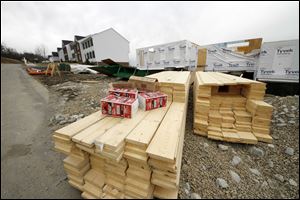
New homes losing their luster
4/17/2011
Housing materials await construction at a development in Canonsburg, Pa. As housing prices fall, more buyers are turning to resale. New-home sales have fallen to the lowest they've been since 1963.
WASHINGTON -- A new house, the dream of many would-be buyers, is making less financial sense in many places.
Prices of previously occupied homes are falling rapidly, pulled down by waves of foreclosures and short sales. A short sale occurs when a lender lets a homeowner sell for less than is owed on the mortgage. By contrast, new houses have become more expensive.
The median price of a new house -- the price at which half sell for more and half sell for less -- has risen almost 6 percent in the past year to $230,600. New-house sales have plummeted in the past year to the lowest level since records began being kept in 1963.
In comparison, prices of previously occupied houses have fallen almost 3 percent in the past year. The National Association of Realtors said the median price for a resale in February was $156,100, a difference of $74,500, or 48 percent, the highest in at least a decade. In healthier markets, a new house typically is about 15 percent more, according to government data.
"A lot of people are saying, 'If I can get a great deal on a home already on the market, why go through the headaches of getting a new home?' " Mark Vitner, a senior economist with Wells Fargo, said.
Home prices and sales vary sharply among metro areas. Cities with more foreclosures tend to have more resale homes that have languished on the market and are priced at a bargain.
In some areas, older houses were more expensive before the housing-market bust. That was especially true in urban neighborhoods with little or no room left for building. But now, buyers get their pick even in some of the trendiest places.
Many builders are waiting for new-house sales to pick up and for the glut of foreclosures and other distressed properties to be reduced. But with 3 million foreclosures forecast this year, a turnaround isn't expected for at least three years.
Fewer new houses sold means fewer jobs to an economy that has 8.9 percent unemployment. About 2.2 million overall construction jobs -- nearly a third of the employment in January, 2007 -- have vanished.
An average of three jobs and $90,000 in taxes are created for each house built, the National Association of Home Builders shows.